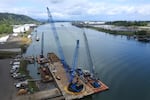A condition in the military’s annual budget could require it to take its fair share of responsibility for cleaning up Superfund toxic cleanup sites, including the Portland Harbor, for the first time.
The Department of Defense budget bill, approved Tuesday night by the U.S. House and now heading to the Senate, includes a provision from Rep. Earl Blumenauer, D-Ore., that acknowledges the Department of Defense’s role in polluting the environment. It would also hold the military accountable for contamination at hazardous waste cleanups around the nation, which are known as Superfund sites. Blumenauer’s provision would require the Department of Defense to come up with thorough plans detailing its contribution to the pollution, what steps it will take to clean up the sites, and how it will conduct outreach with affected communities.
Blumenauer said in an interview Wednesday that requiring the U.S. military to pay its share of cleaning up contamination to the environment would be a game-changer — as well as a way to reduce local governments’ cleanup costs.
“The Department of Defense has never really acknowledged their responsibility,” he said. “They haven’t put any resources into it and they’re not setting aside anything to help us and if the federal government doesn’t acknowledge and undertake its responsibility that means that it’s a lot higher cost for the rest of the people that can’t avoid it.”
About 73 million people live within three miles of a Superfund site, including 28% of the United States’ people of color.

Hundreds of parties share responsibility for cleaning up the Portland Harbor Superfund site.
Cassandra Profita/OPB
Oregon has 13 Superfund sites. One of the sites that would benefit from this provision would be the Portland Harbor Superfund site. The area covers almost 11 miles of the Willamette River from the Broadway Bridge north to the Columbia Slough. It was an area utilized for building and scrapping ships throughout World War I, World War II and up to the Korean War. It’s been highly contaminated with dozens of pollutants from more than a century of industrial use.
The area is significant for five tribes that used that river for thousands of years for fishing and hunting. Those tribes are: the Confederated Tribes of Grand Ronde, the Confederated Tribes of Siletz Indians, the Confederated Tribes of Warm Springs, the Confederated Tribes of Umatilla Indian Reservation and the Nez Perce Tribe.
“There’s impact for people up and down the river,” Blumenauer said. “It affects Native people, it affects certain neighborhoods where people didn’t have access to the river in their backyard or front yard.”
The Environmental Protection Agency oversees the cleanup for Superfund sites and partners with responsible agencies. It has recently finalized cleanup agreements for the Portland Harbor Superfund site with 12 responsible parties. The agency estimates it will take roughly 13 years and $1 billion to clean up the site.
“This provides some certainty, some action in terms of the cleanup, protecting the health of people who live along the river and being able to meet our obligations to Native Americans who have treaty rights to being able to have the rivers condition restored.”
The legislation now awaits action in the Senate before it can reach President Joe Biden for final approval.
A spokesperson for the Department of Defense said it does not comment on pending legislation, citing agency policy.
